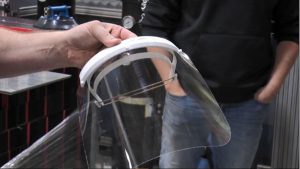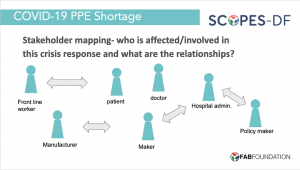With the COVID-19 pandemic and the subsequent personal protection equipment (PPE) shortage, it has been amazing to see the response in the maker community. From families at home doing what they can on their 3D printers to large community-based makerspaces with lasers and computer-numeric-controlled (CNC) equipment, makers everywhere have been answering the call from healthcare and frontline workers. This unprecedented grassroots response to an international manufacturing supply chain gap can be an educational opportunity for students. The SCOPES-DF Community has responded to our call for UNPLUGGED Lessons. With schools and school-based Fab Labs closed indefinitely, how can we involve students in this community response?
Liz Whitewolf, Engagement and Program Manager at the Fab Foundation spoke with educators and makers on a community meetup call in early May to discuss the potential for learning, “This pandemic and the maker community’s response provide opportunities for students to prototype, use empathetic design, and learn about manufacturing, government regulations, healthcare professions, and a variety of other things.” Getting people together to discuss their local community responses and their ideas for engaging students through this time was the focus of the SCOPES-DF Community Virtual Meetup.
During the meetup, four maker educators presented what their schools and labs have been doing in this response and to lead discussions with over thirty other educators in identifying ways of bridging the gap from education to this PPE shortage. These featured speakers were Tom Dubick from the Fab Lab at Charlotte Latin School, Ainsley Buckner from Thinkbox at Case Western Reserve, Anna Delia from Hawken School in Ohio, and João Leão from VIVALab in Portugal. Each speaker shared their experiences with their local schools and communities and how their makerspaces are responding.
While Hawken Makerspaces are focusing on distributing hand-sewn masks and 3D printed flexible ear guards to support the mask straps, other spaces are using laser cutters or CNC routers to build as many face shields as possible for their local healthcare workers. Both Thinkbox and VIVALab are also functioning as local coordinators in the maker response, with VIVALab launching a call for participation and a website connecting local volunteers with design files, resources, and opportunities to participate.

After the panelists shared what their labs and schools are doing in the PPE shortage and how students are or can be involved in that response, Liz called for the whole group to consider the situation from varying perspectives. How is this situation affecting different stakeholders in the local community and globally and how can we make those effects into learning opportunities?

After small group brainstorming, meetup participants shared some of their takeaways from the discussion and important questions to continue the dialogue:
-
- Think about opportunities for students to practice empathetic design. There are so many stakeholders in this crisis, where is the help needed?
- Without access to digital fabrication tools, how else can students solve the design challenge for PPE?
- Funders and funding are an important part of the stakeholder puzzle and can’t be left out. How do they fit in?
- What opportunities are there when schools resume in challenging the students to prepare better for the next shortage/quarantine?
- Mental wellbeing is important during this time, so keep the fun in making.
- Real-world connections are more important now, and this situation gives ample opportunity for students to connect with professionals, makers, and essential employees who are doing important work right now.
In addition to virtual events and meetups, SCOPES-DF offers opportunities for educators to engage with their students using virtual, UNPLUGGED Lessons through our platform. Check out the Resources available through the community of practice as we all learn to navigate through this new educational paradigm.
